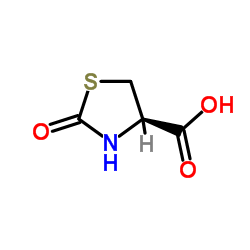Protective effect of a cysteine prodrug and antioxidant, L-2-oxothiazolidine-4-carboxylate, against ethanol-induced gastric lesions in rats.
Meshal Al Moutaery, Hannan Al Rayes, Ramaiz Al Swailam, Ibrahim Elfaki, Haseeb Ahmad Khan, Mohammad Arshaduddin, Mohammad Tariq
Index: Exp. Toxicol. Pathol. 64(3) , 233-7, (2012)
Full Text: HTML
Abstract
Earlier studies have suggested an important role of glutathione (GSH) in cytoprotection against free radicals induced oxidative damage. This study reports gastroprotective effects of a cysteine precursor, L-2-oxothiazolidine-4-carboxylate (OTC), in experimental models of gastric secretion and ulceration. Acid secretion studies (volume and acidity) were undertaken in pylorus-ligated rats whereas the gastric lesions were induced by ethanol. Different groups of animals were treated with OTC (0, 100, 200 and 400 mg/kg). The levels of gastric wall mucus, nonprotein sulfhydryls (NP-SH) and myeloperoxidase (MPO) were measured in the glandular stomach of rats following ethanol-induced gastric lesions. Both medium and high doses of OTC significantly reduced the volume and acidity of gastric secretion in pylorus-ligated rats. Pretreatment with OTC significantly and dose-dependently attenuated the formation of ethanol-induced gastric lesion. OTC significantly protected the gastric mucosa against ethanol-induced depletion of gastric wall mucus, NP-SH and MPO. The gastroprotective effects of OTC may be attributed to its ability to inhibit neutrophils activity and replenish GSH demand.Copyright © 2010 Elsevier GmbH. All rights reserved.
Related Compounds
| Structure | Name/CAS No. | Molecular Formula | Articles |
|---|---|---|---|
 |
Oxothiazolidinecarboxylic acid
CAS:19771-63-2 |
C4H5NO3S |
|
Activation of the Nrf2-regulated antioxidant cell response i...
2015-07-01 [Biomaterials 56 , 114-28, (2015)] |
|
Three-dimensional quantitative structure-activity relationsh...
2011-11-01 [Bioorg. Med. Chem. 19 , 6409-18, (2011)] |
|
Protective effect of procysteine on Acinetobacter pneumonia ...
2013-10-01 [J. Antimicrob. Chemother. 68(10) , 2305-10, (2013)] |
|
The ameliorative effects of L-2-oxothiazolidine-4-carboxylat...
2013-01-01 [Molecules 18(3) , 3467-78, (2013)] |
|
Procysteine increases alcohol-depleted glutathione stores in...
2010-01-01 [Alcohol Alcohol. 45(6) , 495-500, (2010)] |